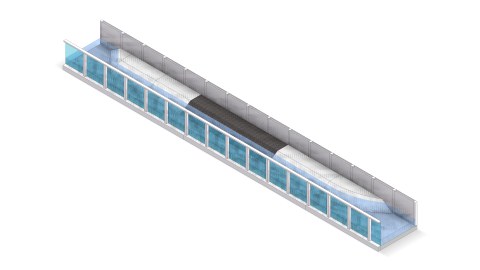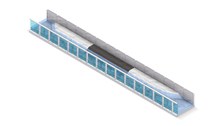Daten- und risikobasierte Entwicklung innovativer Bauweisen für eine klimaadaptierte Verkehrsinfrastruktur
Inhaltsverzeichnis
Kurzbeschreibung
Motivation
Der Klimawandel ist Realität und verursacht wetterbedingte Naturkatastrophen infolge von Starkregen und Sturzfluten, Überschwemmungen, Stürmen oder auch Dürren und Hitze. Zukünftig ist zudem eine Verschärfung der Risikolage für lokal begrenzte Starkregenereignisse verbunden mit Hochwasserzuständen zu erwarten, die je nach Topographie und Oberflächenbeschaffenheit zu starken Oberflächenabflüssen mit hohen hydraulischen Belastungen (Überflutungen, Überströmungen, Unterspülungen, Kolkbildungen, etc.) auf die straßenbauliche Verkehrsinfrastruktur führen. Im Kontext des Risikomanagements spielt auch die Nutzbarkeit der Verkehrsinfrastruktur vor, während und nach einem Hochwasser- oder Starkregenereignis eine große gesamtgesellschaftliche Rolle (z. B. Gewährleistung von Versorgungs- und Evakuierungswegen im Ereignisfall). Dies spiegelt sich in einer konkreten Resilienz der Verkehrsinfrastruktur gegenüber Naturereignissen dahingehend wider, bestimmten Einwirkungen zu widerstehen bzw. sich diesen anzupassen oder im Nachgang zügig zu regenerieren.
Zielstellung und Methodik
Das Projekt Pave4Climate zielt darauf ab, Methoden und Maßnahmen zum Bau und Erhalt klimaresilienter Straßeninfrastruktur zu entwickeln. Der Fokus liegt auf risikobasierten Anpassungsmaßnahmen gegenüber klimawandelbedingten Extremwetterereignissen wie Hochwasser und Hitze. Durch die Identifikation von Ursache-Wirkungs-Ketten werden klimaangepasste Ertüchtigungsmaßnahmen abgeleitet und risikobasierte priorisierte Streckenabschnitte für Anpassungsmaßnahmen identifiziert. Das Projekt orientiert sich am Stand der Forschung und nutzt Laborexperimente, Simulationen und Künstliche Intelligenz, um komplexe Ursache-Wirkungs-Ketten von Hochwasserschäden zu untersuchen. Zusätzlich werden innovative Baustoffe und Bauweisen entwickelt, die nicht nur die Auswirkungen von Starkregen und Hochwasser minimieren, sondern auch den steigenden Temperaturen infolge des Klimawandels standhalten. Das Vorhaben berücksichtigt den Einfluss des Klimawandels auf Naturkatastrophen und hebt die Bedeutung der Resilienz der Verkehrsinfrastruktur hervor.
Unterziele
- Zusammenstellen von Schadensinformationen zu unterschiedlichen Straßenoberbauten infolge hydraulischer sowie thermischer Belastungen
- Beurteilen der Schadensanfälligkeit unterschiedlicher Straßenaufbauten im physikalischen Laborversuch für die maßgebenden hydraulisch bedingten Schadensprozesse
- Identifikation von Schadensmechanismen und Bewertung der Erosionsbeständigkeit bei Strömungsangriff auf Straßenbaumaterialien
- Risikobewertung für Schadensfälle an der Straßeninfrastruktur unter Beachtung eines übergeordneten Ursache-Wirkungs-Modells
- Aufbau und Anwendung semantischer digitaler Modelle und Erfassung von Straßeninfrastrukturen mit erhöhtem Schadensrisiko unter Verwendung von KI-Techniken
- Konzeption und Bewertung temperaturadaptierter Asphalte und Bauweisen, Identifikation von temperaturbedingten kritischen Beanspruchungszuständen in Betonfahrbahnen
- Bewertung von Straßenaufbauten hinsichtlich ihrer Tragfähigkeit bei hohen Wassergehalten
- Dimensionierungsvorschläge für klimaadaptive und resiliente Straßeninfrastrukturen; Empfehlungen für die Wahl von Baustoffen und Baustoffgemischen
Medien

© Die Autobahn GmbH

© R. Reboucas
© R. Reboucas
Projektdaten
|
Kerninformation |
|
|
Zeitraum |
06/2024 – 05/2027 |
|
Art der Finanzierung |
Drittmittel |
|
Fördermittelgeber |
Bundesanstalt für Straßenwesen (BASt) |
|
TUD Forschungsprofillinien |
Energie, Mobilität und Umwelt › Wasserforschung |
|
Ziele für Nachhaltige Entwicklung (SDGs) |
SDG 6 – Sauberes Wasser und sanitäre Einrichtungen SDG 9 – Industrie, Innovation und Infrastruktur SDG 11 – Nachhaltige Städte und Gemeinschaften SDG 13 – Maßnahmen zum Klimaschutz SDG 17 – Partnerschaften zur Erreichung der Ziele |
|
Schlagwörter |
Klimaresilienz, Verkehrsinfrastruktur, Modellentwicklung |
Projektleitung
 © Andrè Terpe
© Andrè Terpe
Professor
NameHerr Prof. Dr.-Ing. Jürgen Stamm
Institutsdirektor, Professur Wasserbau, Bereichssprecher
Eine verschlüsselte E-Mail über das SecureMail-Portal versenden (nur für TUD-externe Personen).
Besuchsadresse:
Beyer-Bau, Raum 106 George-Bähr-Str. 1
01069 Dresden
Sprechzeiten:
Termine nur nach vorheriger Absprache (telefonisch oder Email)
Projektbearbeitung

Wissenschaftlicher Mitarbeiter
NameHerr Dr.-Ing. Ulf Helbig
Leiter Hubert-Engels-Labor
Eine verschlüsselte E-Mail über das SecureMail-Portal versenden (nur für TUD-externe Personen).
Besuchsadresse:
Beyer-Bau, Raum 107 George-Bähr-Str. 1
01069 Dresden
Sprechzeiten:
Bitte vereinbaren Sie im Voraus per E-Mail einen konkreten Termin.
 © Gabriela Nande
© Gabriela Nande
Wissenschaftliche Mitarbeiterin
NameFrau Alejandra Gabriela Orozco Nande M.Sc.
Eine verschlüsselte E-Mail über das SecureMail-Portal versenden (nur für TUD-externe Personen).
Besucheradresse:
Beyer-Bau, Raum 139A George-Bähr-Str. 1
01069 Dresden
Deutschland
 © Ringo Reboucas
© Ringo Reboucas
Wissenschaftlicher Mitarbeiter
NameHerr Ringo Rocha Reboucas M.Sc.
Eine verschlüsselte E-Mail über das SecureMail-Portal versenden (nur für TUD-externe Personen).
Besuchsadresse:
Beyer-Bau, Raum 136 George-Bähr-Str. 1
01069 Dresden
Sprechzeiten:
Bitte vereinbaren Sie im Voraus per E-Mail einen konkreten Termin.
Projektpartner:innen
|
Partner:in |
Typ |
Website |
|
Institut für Stadtbauwesen und Straßenbau (ISS), TUD |
Intern |
https://tu-dresden.de/bu/bauingenieurwesen/isb |
Publikationen
-
Weitere Informationen
Notfallaktionsplan „Hochwasser-, Starkregen- und Temperaturereignis“
Förderung
Das Forschungsvorhaben FE 88.0180/2023/IE01 wird gefördert durch die Bundesanstalt für Straßenwesen im Auftrag des Bundesministeriums für Digitales und Verkehr. Die Verantwortung für den Inhalt liegt allein beim Autor.
Datenschutz
Im Rahmen des Projekts werden Datensätze des Sächsischen Staatsministeriums für Infrastruktur und Landesentwicklung zum Hochwasserereignis 2021 im Freistaat Sachsen ausgewertet. Ziel ist es, die entstandenen Schäden wissenschaftlich zu analysieren und daraus Erkenntnisse für eine resilientere Verkehrsinfrastruktur abzuleiten. Die Verarbeitung der Daten erfolgt unter strenger Wahrung des Datenschutzes. Eine eigens erstellte Datenschutzerklärung regelt den Umgang mit den Informationen. Der Zugriff ist ausschließlich den beteiligten Projektpartnern vorbehalten und beschränkt sich auf die wissenschaftliche Arbeit im Rahmen von Pave4Climate.





